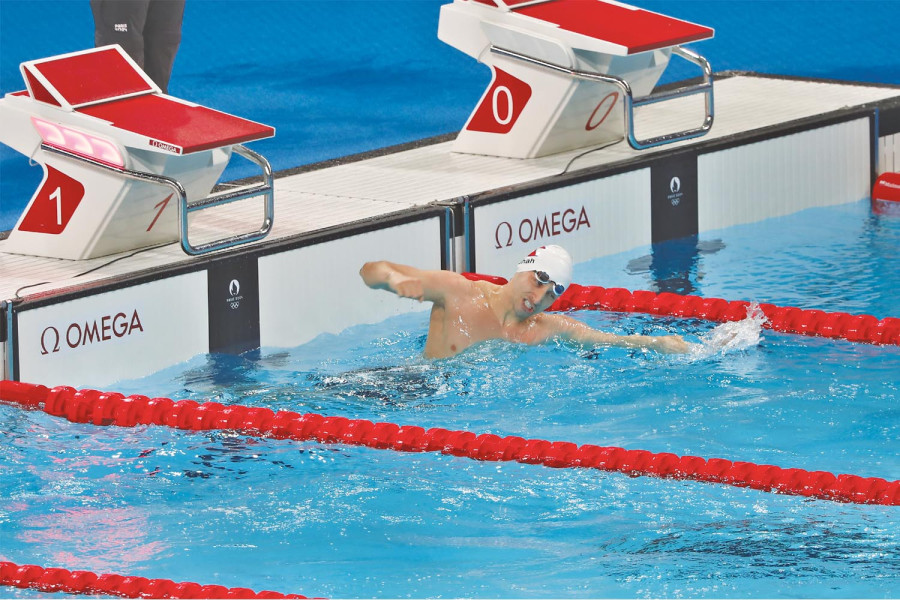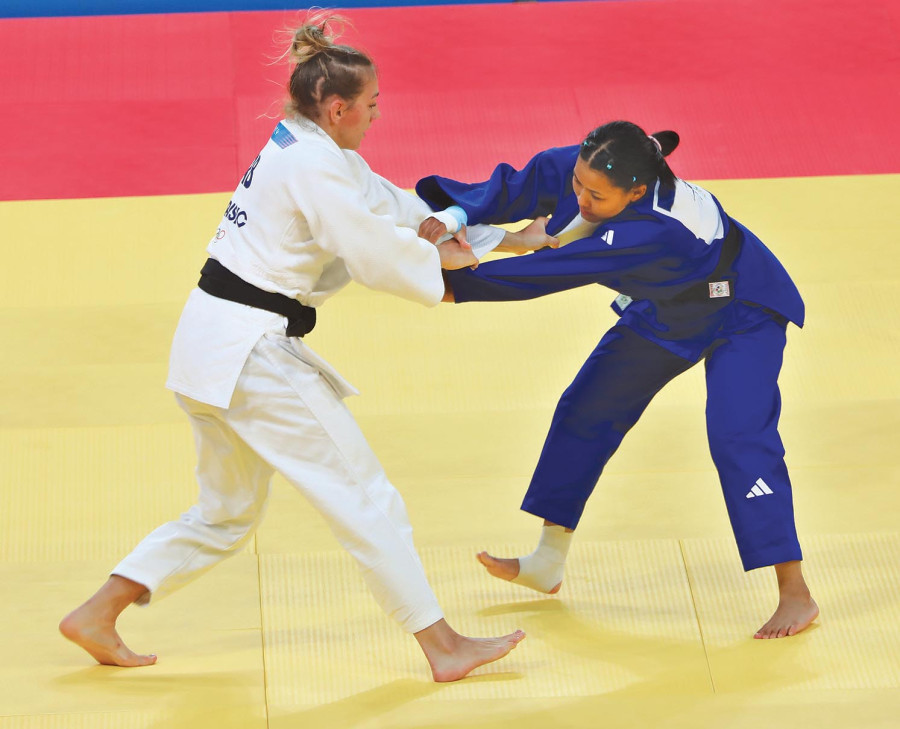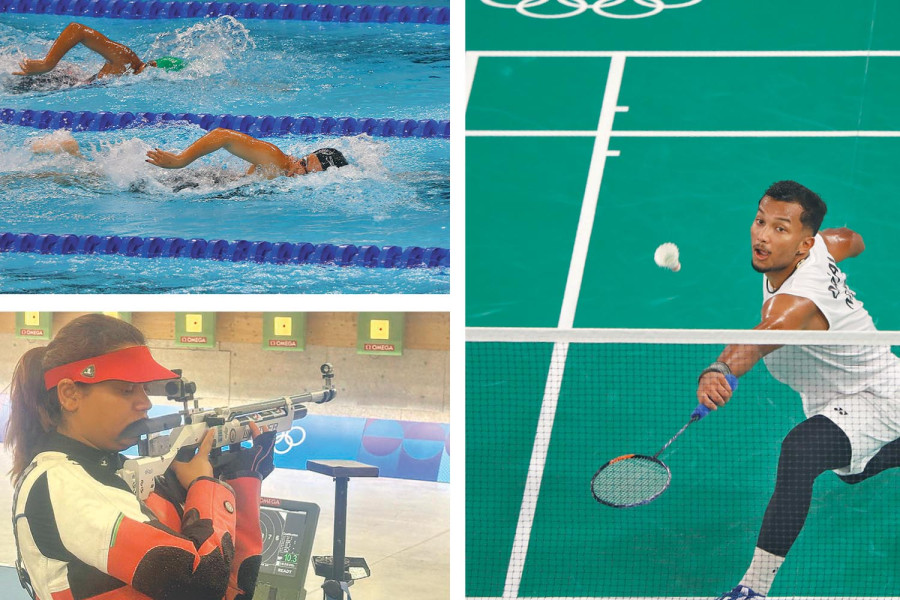Sports
Nepal has a long way to go before it is Olympics-ready
The nation has yet to win official Olympics medal. Winning one is ‘unrealistic’ given its poor show even at Asian level.
Dil Kumar Ale Magar
Another Olympic Games has come and gone and Nepal’s quest to bring home an official Olympic medal continues to seem like a pipe dream.
Nepal sent seven athletes to the 2024 Summer Games in Paris to compete in six different sports but none of them will have anything to show for back home—no athlete from Nepal has won a single official medal in the country’s 60-year Olympic history.
But, is it at all realistic to expect an Olympic medal from Nepali athletes?
“Winning a medal at the Olympics is not impossible. But our investment and preparation for the Olympics and other international events are woefully inadequate,” said former Olympican Deepak Bista, who currently serves as the president of Nepal Olympians Association and the director of national team preparation, at the National Sports Council. “There are no proper venues for players to train and practice, So how do you compete against elite athletes from around the world?”
Athlete Santoshi Shrestha completed the difficult 41.195km track of the women’s marathon event in the 79th position out of 91 athletes. Her timing of 2 hours 55 minutes and 06 seconds was far from her previous best and national record of 2 hours 46 minutes and 23 seconds, which she set on the way to marathon debut gold at Bangabandhu Sheikh Mujib Dhaka Marathon earlier this year.
After the women’s marathon, Santoshi said she could have set a new national record in Paris had she pushed herself more in an endurance-testing track, but she chose not to because of fear of possible injury.
“I could not take the risk because the track was very steep after 15 km. I was comfortable and could have made a new record there [in Paris] but I chose to stay in the comfort zone. I want to compete in other tournaments as well,” said Santoshi.
But Santoshi’s story could have been different had her preparations and training back home been better.
“Further, players, coaches and team management all need to work hard with complete focus and dedication all round the year if they are to bring medals. Sadly, the state of our players is not good enough. They are compelled to find other jobs so that they can look after their families. How can we expect them to win medals at big tournaments?” added Bista, who was the second Nepali athlete to qualify for the Olympics, Beijing 2008.
“The players need physical, mental and financial support.”
Former Nepali Olympian Sangina Baidya also points to poor investment and preparation in sports for Nepal’s underperformance at the Olympics.
“There is a lack of extensive investment in sports infrastructures. The state should be interested in the development of sports. If there is sufficient investment at the youth level, and they get substantial funding, resources and infractures, they can undoubtedly perform better in the international competitions including the Olympics,” said taekwondo practitioner Baidya, who was the first Nepali athlete to qualify for the Olympics, in Athens 2004, through a selection tournament.
“In comparison to other successful countries, here in Nepal, preparations for the Olympics start late. They get only a few months of training, which is not enough,” she added.
Judoka Manita Shrestha Pradhan has a similar story. She got a training room only two months before the Olympics and she was still expected to win at least one or two bouts in Paris—which is a lot to ask for. Shrestha Pradhan could not progress beyond the first round of women’s 57 kg weight category event.
There is no targeted budget for the Olympics programme despite the sports sector getting Rs3.5 billion for the fiscal year 2024/25. Only Rs9 million was allocated for the transport, lodging and food of athletes and officials participating in the Paris Olympics and Paralympics.
The Nepal Olympic Committee provides $750 per person to the 10 athletes of the 10 sports under the International Olympic Committee’s Solidarity scholarship, which is insufficient.

Swimmers Alexander Shah and Duana Lama trained abroad, in the United States and Thailand, respectively, but the scholarship amount was not enough for them to train at top-class facilities. Lama finished last in her Heat and 30th overall in women’s 200m freestyle.
Shah, who was competing at the Olympics for a second consecutive time, will at least return home with some joy. His 51.91 seconds in the men’s 100m freestyle Heat shattered his own previous national record of 52.17 seconds set during the World Aquatic Championship in Doha, Qatar.
Badminton star Prince Dahal trained in Sri Lanka and had to travel to Paris 2024 without a coach as Nepali authorities did not send the name of the coach for accreditation and visa process on time.
Prince Dahal could not win a single match in the men’s singles group stage. Shooter Sushmita Nepal finished 42nd in the women’s 10m air rifle qualification event. Table tennis player Santoo Shrestha also exited the Olympics from the men’s singles preliminary round.
But big investment in sports may not always do the trick.
Santoo Shrestha, who competed in the men’s singles table tennis at Paris Olympics, was the only third player in Nepal’s Olympic history to qualify for the Olympics through the selection stage—which is a perfect demonstration of how poor the country is technically.
Take Jamaica and Kenya. Athletes in these countries are highly successful in athletics.
Jamaica—the home of sprinter Usian Bolt, eight time Olympic gold medallist and world record holder in the 100 metres, 200 metres, and 4 × 100 metres relay—has won a total of 87 medals at the Olympics. Of them 86 have come from track and field.
Kenya is the most successful African country at the Olympics, with a total of 124 medals so far. Of them 117 are from track and field and seven from boxing.
Ethiopia is another nation which focuses on long-distance events. Their total of 58 Olympic medals have all come in long-distance events in athletics.
India was once a dominant country in field hockey and won a record 11 Olympic medals, including eight golds between 1928 and 1980. Although the country experienced a drought in hockey medals, the sport is gradually finding new success after its team picked two consecutive hockey bronze medals in Tokyo 2020 and Paris 2024. Wrestling and shooting are the other sports Indian athletes specialise in.
“The government should learn from how other countries prepare their athletes,” said Bista, suggesting that Nepal should target some sports for the 2028 Summer Olympics in Los Angeles and prepare accordingly.
Nepal has won a total of 26 medals at the Asian Games. Of them, it has bagged 24 medals in martial arts, which include karate (4), taekwondo (14) and boxing (6).

“Nepal should select sports in which Nepal is historically good, for instance martial arts. After that, the government should allocate a significant budget just for the Olympics programme and train the players from the beginning if it expects our athletes to do better,” Bista added.
Technically, Nepal’s only medal at the Olympics came in 1988 in Seoul when Bidhan Lama won a bronze medal in the men’s 50kg weight category taekwondo competition. But his medal was counted as unofficial as the sport was then an exhibition event. Taekwondo entered the Olympics programme only at Sydney 2000.
But the 2026 Asian Games in Aichi-Nagoya, Japan could be a head start.
The National Sports Council has launched Mission 2026 as part of the preparations for the next Asiad and has targeted at least 10 medals. But, sadly, the government has only approved Rs20 million for the programme.
“We don’t have enough funding for the programme. This amount will support our athletes for only five to six months. It is unfortunate that the government could not embrace the NSC’s mission.” Bista said, adding that he fears Mission 2026 will just be an ambitious dream.
But Bista hopes Palesha Goverdhan may change history despite the odds. Goverdhan became the first Nepali paralympian to pass the selection stage when she qualified for the Paris Paralympics. She won a gold medal in the Asian Qualifiers in China.
Govardhan also won a bronze at the 2022 Asian Para Games, becoming the first Nepali para athlete to win a medal at the event.
“Palesha is training in London under one of the best trainers,” said Bista who added that the NSC is paying her training fees.




 16.47°C Kathmandu
16.47°C Kathmandu















